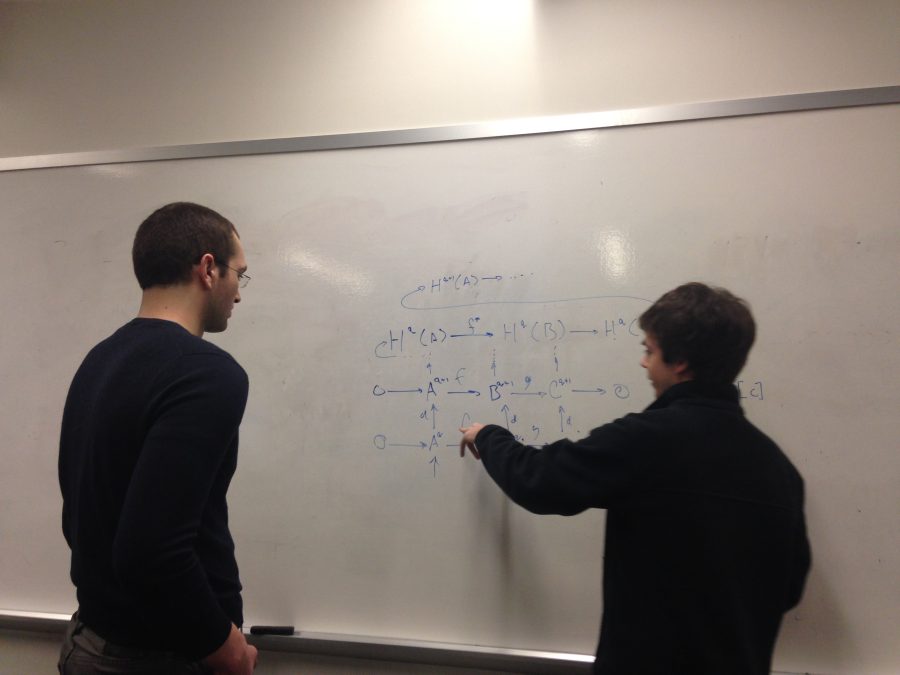The University of Massachusetts Boston took 24th place in the Putnam Competition, an international math exam which consists of 12 high difficulty questions. The median score is usually zero to three points.
Similar to schools like Massachusetts Institute of Technology and Harvard University, participation in the Putnam exam is becoming a tradition for UMass Boston.
The former local organizer of the Putnam exam, Ethan Bolker, first started recruiting students to participate in Putnam back in 1972, when the UMass Boston campus was still at the Downtown location. When Professor Bolker first joined the Math Department at UMass Boston, he decided to send out some letters, searching for students who would be interested in taking part in the exam. One student who showed up in his office was Paul Masson. “Paul knocked on my door and said his calculus instructor sent him to me, because he thought he was pretty good.” Mason was one of the first UMass Boston students to take the exam and holds the best record with his 1977 scores. He came to UMass Boston without a high school degree and took the exam four times, first time being during his freshman year, in 1972.
Rory Martin-Hagemeyer and Vincent Luczkow are studying mathematics at UMass Boston. They participated in the 2014 Putnam exam and currently are part of the math club, which is lead by Luczkow. These bright students are on the top 10 student ranks for the past ten years at Umass Boston. They agree that if more UMass Boston students chose to participate in the Putnam examination, the school could do better in the upcoming years. Although, Luczkow is in his last year of college and Martin-Hagemeyer is in his junior year, they both have enough time in their undergraduate careers to be able to take the Putnam again. In the meantime, the math club members have their regular meetings, where they focus mainly on strengthening their skills at Putnam-type problem solving.
They were aware of the exam before taking the seminar course taught by Professor Catalin Zara, who is also the local organizer of the exam. So, despite the extreme difficulty of the exam, it is possible for a student at UMass Boston to become better prepared for the competition. All the students who took the exam last year were part of the seminar, also known as Math 390. The preparation course helps students to see possible ways to start solving the problems, familiarizes them with the type of problems they’ll face on the Putnam, and, as Martin-Hagemeyer claims, provides emotional support.
The emotional support and reassurance seems to play a big role in taking this exam. This can be understood from Professor Bolker’s experience with taking the Putnam for the first time. “As a freshmen I signed up for the Putnam exam, and I walked in to take the exam and I thought I couldn’t do any of these problems.” He continued, “If you come as a captain of the math team in your high school and you take the exam in your freshman year, and you get 0/120 or 7/120, it is very discouraging, so I didn’t look at the exam again as an undergraduate.” To make sure that students do not get discouraged, Professor Zara explained that it is important to make the level of difficulty of the exam very clear to the students. “We work very carefully on this, to make sure that they do not get discouraged by a low score; a low score in the Putnam does not mean that you’re not cut out for math.”
Furthermore, Zara said that it’s not entirely math that is important in solving these difficult questions. “It’s absolutely creativity that is important in this competition, because you might be a very good mathematician but you still might not do well in this competition. It’s really about the way you apply the knowledge of math in this exam.” Students seem to share this view by arguing that one does not need to be a math major to have a chance of doing well on this exam. Martin-Hagemeyer explains that if one has math knowledge up to calculus level, they have the ability to take the exam. This is why the math club is trying to recruit students from different majors to get them to participate in this competition.
Luczkow, the president of the math club, suggests most of the undergraduate college students, especially math majors, should take the test because it looks good on students’ resume and it gives them an opportunity to challenge themselves. Professor Zara claims that getting out of the comfort zone is very helpful in all areas of life, and Putnam helps students to do that in terms of their mathematical education. “If you only try to do things that you know how to do, you never learn anything new and you never know what your limits are.”

